Planning to keep both a cat and a chinchilla in the house, it is important to prepare carefully. It is good if the animals will be best friends or treat each other neutrally. But there is no guarantee that this will happen. Therefore, it is important to prepare in advance for the fact that you have to keep the animals at a distance from each other.
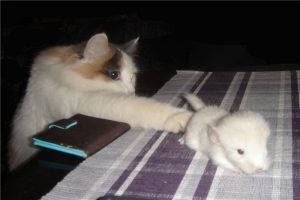
- How do cats and chinchillas get along?
- Chinchillas and cats: friends or enemies?
- Can you keep these two animals in the same room
- Cats and chinchillas: A relationship
- What you should do before introductions are made
- Can a cat eat a chinchilla?
- Do chinchillas get along well with cats?
- The dating process
- How to make chinchilla and cat friends
- Chinchilla – review
- British chinchilla – review
- Do chinchillas make noise at night?
- What are the dangers of chinchillas
- Peculiarity of the relationship between chinchillas and cats
- Can the two animals be kept in the same room?
- Chinchilla vs. cat, what do you want?
How do cats and chinchillas get along?
Often animal lovers have such situations when they have to keep pets of different species in the same room. Many people wonder how chinchillas and cats get along, whether they can be placed in their homes without harming each other. The answer to this question is not unambiguous – often everything depends on the circumstances. It is known that animals of such different species as a predator and a rodent, according to the laws of nature, should not be near each other, because it is obvious that the first species can prey on the second. But there are many cases where these pets coexist well in the same area and even become friends, especially if they grew up together.
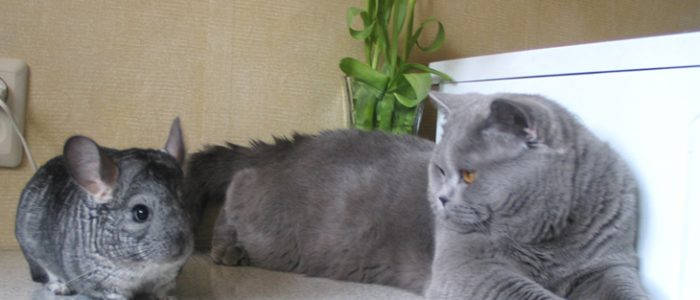
Chinchillas and cats: friends or enemies?
It is difficult to predict the behavior of different species of animals if they find themselves in the same territory. Cats are jealous of their territory, which they are used to walking wherever they want. On the other hand, they are jealous of other pets. Chinchillas are kept in cages or special showcases, sometimes letting them run and frolic in the apartment.
Cats may show interest in rodents, trying to get them through the bars of the cage. Even if the whisker is not going to eat the chinchilla, but just playing, it can be a great stress for the rodent. Therefore, owners should carefully observe the cat's behavior and try not to leave them alone with the big-eared cat. Even if the cat is peaceful and does not attack the chinchilla, it is better to allocate two different rooms to keep them.
Can you keep these two animals in the same room
A cat and a chinchilla can live in a cramped apartment, but they must be adapted first. Often cats consider themselves superior to small rodents and rarely pay attention to them. However, there are occasions when the rodent begins to get a hold of the kitten. In this case, the animals should be separated into different rooms as quickly as possible. If the cat's hunting instinct is strongly developed, it may start hunting for the chinchilla. Waiting and patience in this case will be rewarded and in time the cat will catch the rodent.
Everything will work out in the best way if the chinchilla has been in the family for a long time and the cat is still young. In this case the chinchilla and the cat can live together and treat each other as equals. If the chinchilla is not the first one to arrive, you must let it out very carefully, after observing the cat's behavior next to the cage for a few days.
In case of increased interest in the new pet, you should not let the rodent out for the first time in the presence of the cat. Not the least important will be the character of the cat, whether it is friendly with other pets and whether it will be able to accept another friend and live with it in the same house.
Cats and chinchillas: A relationship
If the chinchilla was the first to be bred, the kitten will be much smaller than her, so instinctively he will be afraid of her. But if the cat is older and the only owner in the house, the cute chinchilla can become a living toy, which will be long tracked down, and one day it will be caught. He won't eat it, but he might bite it several times.
You should remember that a small chinchilla doesn't stand a chance against an adult and venturesome cat. Speed, maneuverability and small size will not help either.
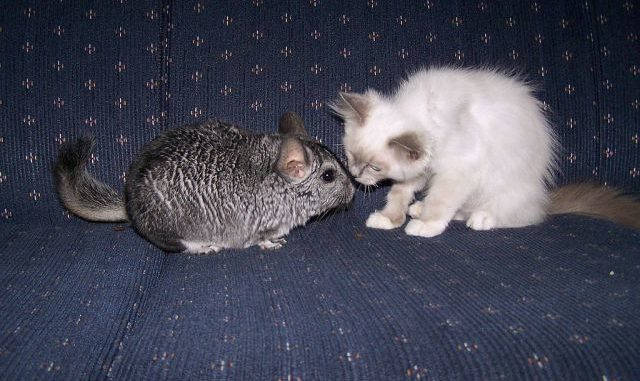
A chinchilla is capable of standing up for itself, but only if it is mature and large. Chinchillas get along with cats, but they should be introduced gradually.
What you should do before introductions are made
Each animal should have its own place or even a house. This way, the chinchilla and the cat will not claim the same place in the house. If the cat is aggressive, then the spending areas should be segregated. The chinchilla can live in the bedroom, if the apartment allows, where the door will be tightly closed and will not let the cat inside. The locations should be completely safe and only with time will the cat be able to get used to the new smell and make friends with the chinchilla. Rodents do not eat meat, so they will not compete with the cat. And only after a while you can introduce them to each other. Their reactions will show if they can get along in one apartment.
Can a cat eat a chinchilla?
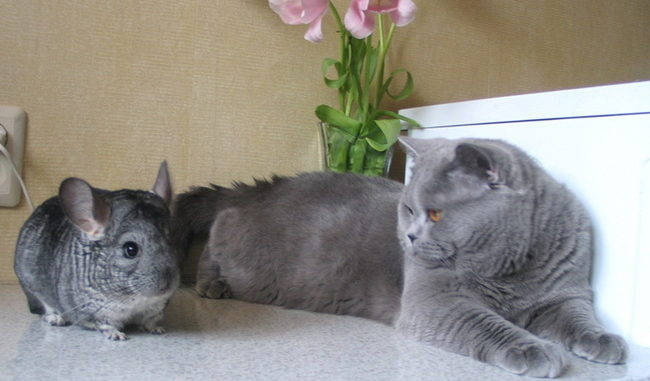
A cat may eat the animal with ease. It is recommended to breed them together and small. Acclimatization should take place in several stages, and as naturally as possible. The first time it is necessary to monitor their time together. House cats are never hungry enough to want to eat a chinchilla, but wild cats can.
Do chinchillas get along well with cats?
It is common for animal lovers to have more than one pet. Unfortunately, when it comes to cats and chinchillas, there are few similarities between them. To begin with, chinchillas are rodents and natural prey for many animals, including cats.
Cats are predators with a strong hunter's instinct. According to the journal Nature, domestic cats living in the wild are thought to kill 1.3 to 4.0 billion birds and 6.3 to 22.3 billion mammals annually. When these two factors are combined, it is clear that chinchillas are vulnerable animals in the presence of cats. Cats, on the other hand, probably consider themselves alpha animals.
Aggressive hunting cats are unlikely to take a rodent into their home. Their instincts will cause them to chase and hunt the animal rather than coexist with it. In turn, the chinchilla will become stressed and refuse to eat or drink. This can lead to serious health consequences and, in extreme cases, death.
Before getting these two animals in the same house, there are various things to consider, including:
The dating process
The steps for introducing a cat to a new resident of the house are as follows:
- explain to the cat that there will be a new resident in the house and he should not be hurt (sounds silly, but adult cats have long understood their owners at the level of instincts);
- take out a chinchilla and give it a sniff in your hands, without making any sudden movements (hold the rodent firmly, so that it does not break free);
- carefully observe the reactions of both animals;
- The cat should also sniff the chinchilla's cage to form a habit;
- Stroke both animals to show they are equal to the owner.
The pets should be given an equal amount of attention in the future to prevent jealousy. If the introduction goes smoothly, you can let the pets play together, but constantly monitor what is going on. It is possible for the pets to simply ignore each other. In this case, they can safely leave each other even unsupervised. In a sense, this would even be ideal for them to exist together.
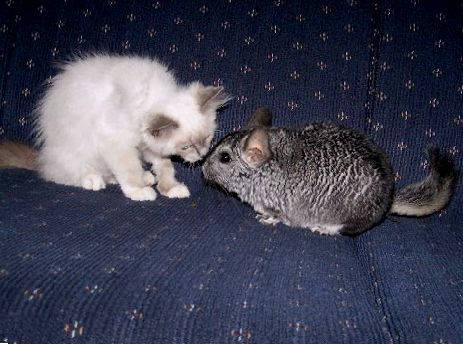
An extreme case is if a cat takes a chinchilla as food. In this case you will have to isolate the animals from each other when the owner will let the rodent out for a walk. When the chinchilla is in a cage, it must be placed out of the cat's reach.
The rodent may not react in any way to the predator. Because of this, the cat may simply get tired and give up any attempts to catch a rival in the territory. However, this does not mean that the cat will give up trying to catch the rodent forever.
How to make chinchilla and cat friends
It is ideal to have a small kitten in the house with an adult chinchilla. This age spread will make the animals equal. When introducing a rodent into a home with an adult cat, you need to be extremely careful. It is important to watch how the old pet will behave near the cage with the newcomer. If the chinchilla will be very attentive, it is better not to let it out to walk around the room at first. An important indicator will be how the cat coexists with other pets (if any) in the house.
Many owners of several animals claim that they and their chinchillas live together peacefully and play with each other with pleasure. At first it looks dangerous (the animals jump on each other, cling to their fur, chase each other), but in reality they are just having fun.
In any case, the owner must be present when the animals play together. At animals, the game at any time can turn into a fight. Even if the pets are friends, you should not leave them alone. For example, chinchillas are not allowed to wet their fur, and a dog or cat can start licking the rodent. Then he will have to "wash" in the sand.
In addition, it is important to remember that the chinchilla is a nocturnal animal. Therefore, it is necessary to place the cage with the rodent during the daytime so that the animal is not disturbed. Any loud sound, conversations, even the noise of a downpour will cause stress to the rodent. The same will happen if the resting chinchilla becomes distracted by other pets.
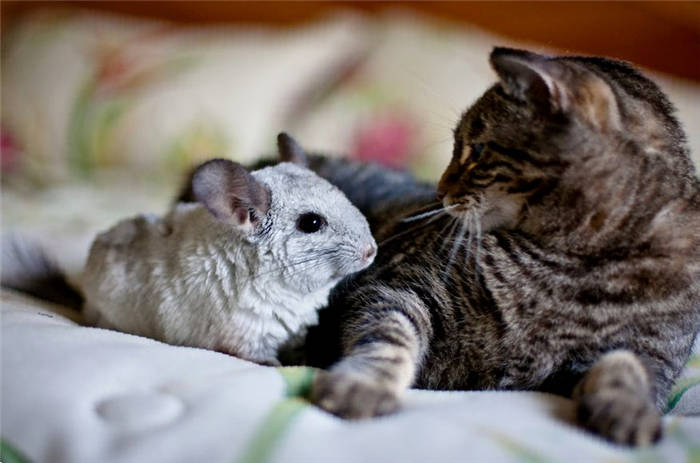
In the end we can say that the introduction to a cat or any other pets is most often successful.. Rodents are quite calm and can coexist with any neighbors. The only question is the reaction of these very neighbors. Therefore, the success of acquaintance depends entirely on the attentiveness of the owner. The second important factor will be the education of the cat. If chinchillas are quite phlegmatic and calm to other animals. It is more difficult to explain to an adult cat that she is not alone in the territory and it is normal.
Chinchilla – review

Schubert was given to us by a friend. She had him stubborn, offended, grudgingly – and as a result, at the age of 2.5, Schubert changed homes. While he was still visiting, he immediately showed his feelings for my husband – he let me scratch his neck and came out to hold him.
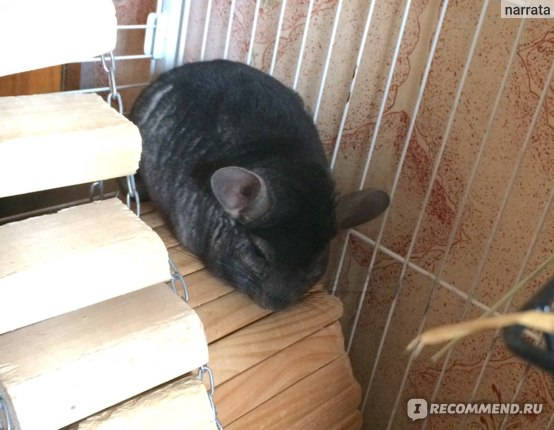
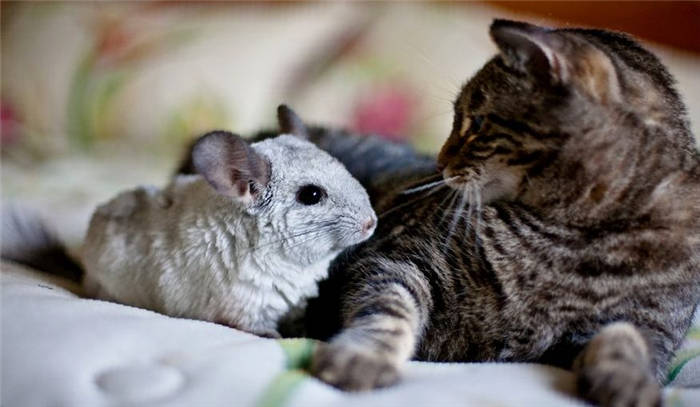
Sat in a corner and was frightened of all the sounds. But in a couple of days the big cage ordered for him arrived and little by little the boy went wild! Now he is very affectionate, always goes to the cuddle, eats treats, and he loves my husband – he jumps on his shoulder, climbs on his head, gives him to scratch in all possible places, and even turns the right side
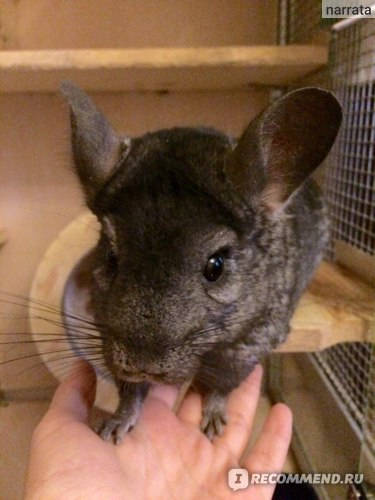
Well, now that a little introduction is behind us, I will tell you about a few problems we have encountered:
1. Cat. The first problem and the most alarming – by that time we already had a cat at home (4 years) and how it will relate to the chinchilla – was a question. Therefore we bought a protected cage – glass and fine mesh, so it would not scratch. Always chased the cat out of the room if you open the cage. But. The first time the cat wondered who it was that had the attention of the whole family. And then she stopped looking in Schubert's direction altogether. Of course, that doesn't negate safety precautions!!! We are responsible for Shunya's life and can't take any chances. I've read many stories where outwardly calm cats have unexpectedly attacked chinchillas. So it's very important to prevent tragedy, and it's the owners' responsibility to keep all pets safe.
In addition, the cat (as well as other pets) can infect the chinchilla – so contact is undesirable.
British chinchilla – review
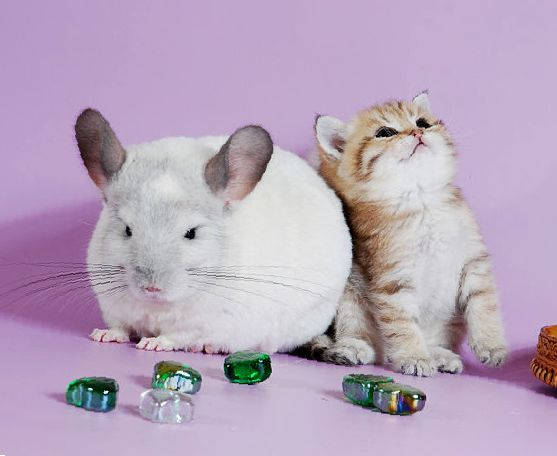
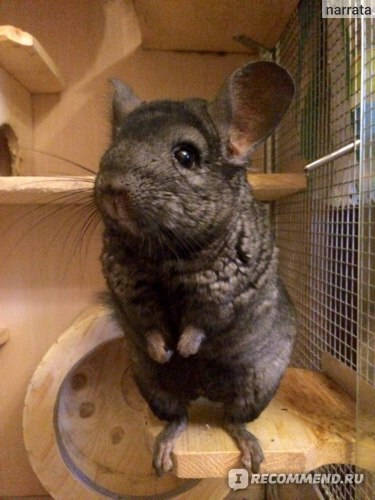
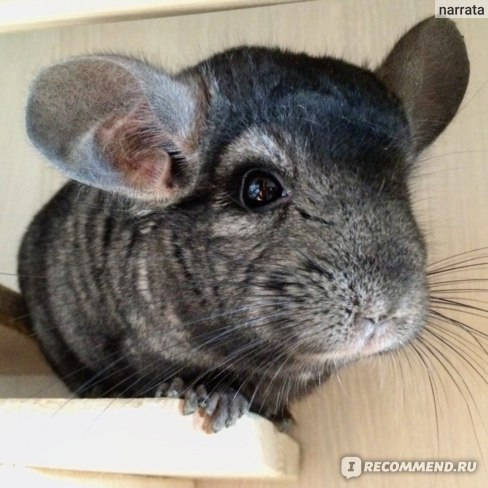
For a long time I did not have any animals in my house. It wasn't that I was afraid of ruining my new home and furniture, it's just that I didn't have kids at the time, and having at least one child was always in my plans. I myself am a supporter of the fact that you need to have a pet after having children. So that after the birth of a child, the pet would not be lacking attention and would not be jealous.
And so, when my son was 7 years old and my daughter was 4, I decided that it was okay to have a pet, since my kids are at an age when they understand that the pet is not a toy and there will be no bullying of the pet in my house. As myself, I think this is a very sensible and appropriate approach to such a serious step as having a new family member. The kids asked for a cat, and I wanted a cat myself. Because the dog needs to be taken out for a walk early, and I like to sleep until 10 o'clock in the morning. At least ?
But it was a British chinchilla we got by chance. I wanted to take an ordinary cat from the street. Just to do a good deed, which would probably be credited in the future. But my man with a high-status job and enormous ambition said that in our house will only be a purebred animal. For me, the question of breed was not a priority, so I gave in. We settled on British Chinchilla, because we liked this breed. The kitten was chosen in two days. With ads on Avito. And we got the breeders not the most correct – since the kitten was fed everything, but the animal was absolutely healthy. The veterinarian, whom we visited on the first day after buying the kitten, advised us on the proper care for the pet. Except that we were sold a kitten and it turned out to be a cat. Naturally, we did not return the animal just because it was a boy and not a girl. Why set the wrong example for the kids, and I wasn't particularly interested in the sex of the pet at all.
Do chinchillas make noise at night?
Chinchilla activity occurs at night. The animals have a cheerful, playful disposition. They are mobile and very active, so they make quite a lot of noise. The pet jumps, climbs on bars, moves bowls and trays, rustles and knocks. Not everyone can sleep in the same room with a disheveled rodent. Mobility decreases with age, and adults behave more calmly. They change the sound and rattle games with the crackle of chewing twigs and the rustle of the filler.
Often, the chinchilla makes noises purposefully, attracting the owner's attention, or asking for a walk.
Breeders recommend to arrange special showcases for pets instead of cages. Experienced owners try to organize an active walk before going to bed. Special measures can reduce the noise level, but cannot completely eliminate the disadvantage. You should not buy a chinchilla if waking the pet at night is unacceptable for family members.
What are the dangers of chinchillas
Chinchillas are not prone to aggression and cases of biting are extremely rare. If the animal is uncomfortable, it will warn of its displeasure with a painless pinch with its teeth before fighting back.
The negative aspects from the reviews of the owners are mostly reduced to the stories of how the inquisitive pet tastes absolutely everything he finds in the apartment. He chews the furniture, tears the wallpaper and has a keen interest in wires.
Keeping chinchillas in unfavorable conditions may lead to diseases.
Relative humidity above 70% promotes fungal infections on the animal's skin. Dermatomycosis is also transmitted to humans. Chinchillas, with proper care, are no more susceptible to disease than other animals. The problem is that there are few veterinarians who understand the peculiarities of the species. Therefore, it is often expensive and troublesome to treat a chinchilla.
Chinchillas do not have a seasonal molt, with minimal hair loss year-round. These rodents are less likely to be catalysts for allergies, but incidents are possible.
Peculiarity of the relationship between chinchillas and cats
Chinchillas are considered very cozy animals – they can peacefully coexist with different pets:
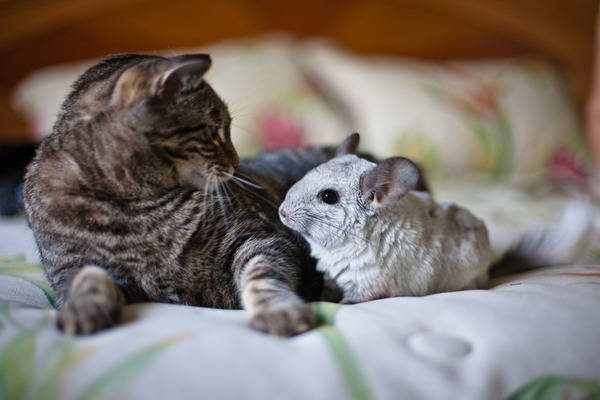
This coexistence is due to the calm and friendly nature of these "plush" rodents. Therefore, to a greater extent, the relationship between the chinchilla and the cat is determined by the nature of the latter. There are two options for the relationship between the animals:
- If the cat is good-natured or indulgent – the pets will peacefully coexist side by side. And if the kind character of the cat is combined with an innate playfulness, and the animals become friends, it is very likely that the owner will have to deal with the results of joint games and antics of pets.
- If a cat is intolerant and willful, with unceasing hunting instinct, the hunt of the moustached predator for the poor rodent will continue to the bitter end, that is, until the little beast will not get into the clawed paws of the pet "lion". The only thing that the owner can do in this situation – is to settle the pets in different rooms and eliminate the possibility of contact fluffy.
Going to keep a rodent in the house at the same time as a cat (or cats), the owner must be prepared for any development of relations between the pets, so that the necessary measures can be taken in time.
Can the two animals be kept in the same room?
Properly adapted chinchilla and cat get along even in a tight space. It is common for cats to look down on domestic rodents. But they treat chinchillas indulgently, preferring not to pay attention to them. The situation is good – there is peace and quiet in the house, no one hunts for anyone, no one fights with anyone.
However, it is not uncommon for rodents to provoke the cat themselves into action. It is possible to provoke a dangerous predator in the domestic pussy rodents, when the animal lacks a sense of proportion and its behavior crosses the line of the acceptable. The most common reasons for the beginning of the hunt:
- Excessive curiosity – when a small animal tries too hard to get to know the kitty up close.
- Rudeness – when a rodent who has settled into a new territory shows disrespect to other inhabitants of the house and tries to show himself as the main one.

Regardless of what exactly was provoked by the hunt or just a conflict between the animals, the owner has only to settle the pets in different rooms and make sure that they do not cross paths again.
Chinchilla vs. cat, what do you want?
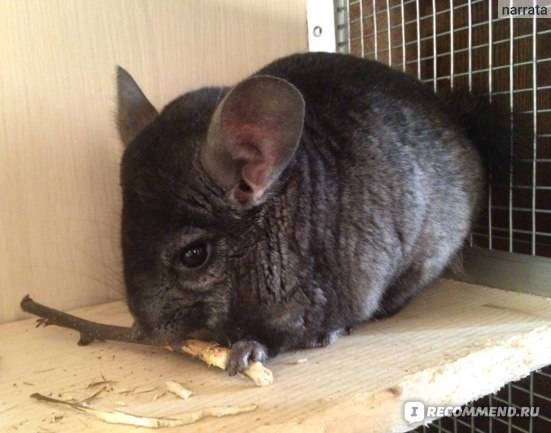
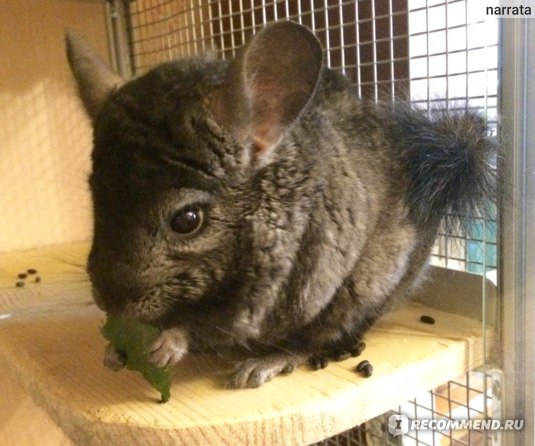
My Shusha gets to the cat all by herself. The cat is fine with him, and she just needs to get to someone. I once freaked out when this naughty girl came and sat down next to me and looked at my head with interest, and then with a ni h, just stupidly took and pecked at my ear.
And the Brit is a silver chinchilla color. So it's a chinchilla showdown.
"Are you trying to fuck me, you dog shit?! Come here, I'll fuck you myself! Motherfucker!" © =)






